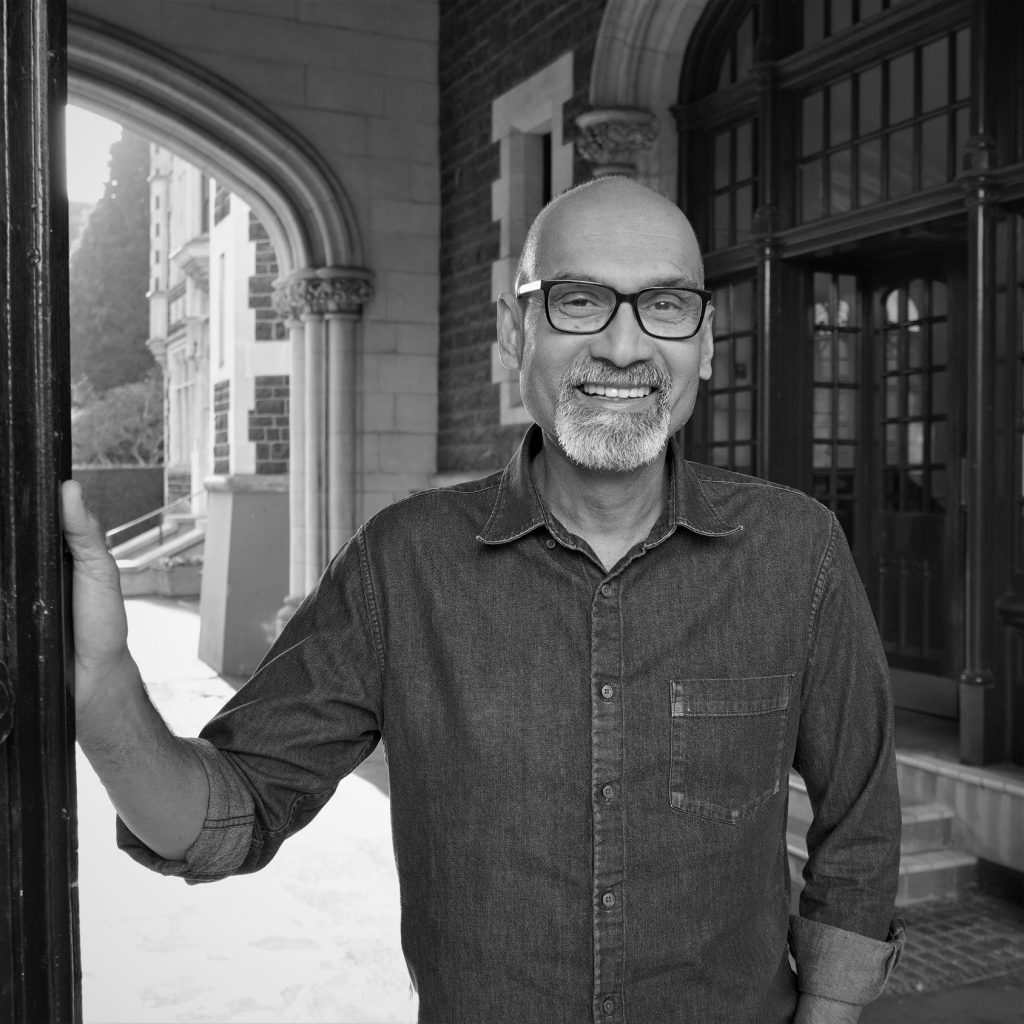Doctoral Education
- Research Themes
- Doctoral Education
Doctoral Education
We investigate the intricacies, challenges, and transformative possibilities of doctoral education. We have particular interests in the doctoral ‘curriculum’, supervision practices, the examination process, candidate experiences, doctoral graduate attributes and career readiness. Through our collaborations we aim to generate evidence-based insights and practical recommendations to enhance the quality, inclusivity, and effectiveness of doctoral education.
Professor Rachel Spronken-Smith talking about doctoral candidates when she was in the Dean of the Graduate Research School.
Find out more
Theme Lead/Contact
Associate Professor Vijay Kumar Mallan
Collaborations
Current and Potential Projects
Past/Current Students
Researchers
Research Outputs
Publications
Associate Professor Vijay Kumar Mallan (Theme Lead/Contact)

Vijay is a founding member of the International Doctoral Education Research Network.
His teaching and research focus is on enhancing the doctoral experiences both for the supervisors and their students. He has developed, disseminated, and published on doctoral support, doctoral examination, and feedback practices. His research philosophy is to produce scholarship that has practical implications.
Professor Rachel Spronken-Smith

During my 9 year term as dean of the University of Otago Graduate Research School where I was involved in training workshops, and providing advice to PhD candidates (and their supervisors), I noticed some areas where research could help enhance the experience of PhD candidates. Prior to taking on the role as dean, my research was focused on innovative curricula and graduate outcomes. It seemed a logical move to take those interests into doctoral education.
I am motivated by a deep desire to improve the experiences and outcomes of PhD candidates. My research in doctoral education comprises three main strands. First, I have a focus on the ‘doctoral curriculum’, arguing for personalised programmes of study that foster an holistic set of graduate attributes. Related to this, I have a curiosity in metamodernism and global citizenship attributes and sensibilities, and whether we should be fostering these more in our PhD graduates so they are well positioned to contribute as global citizens caring for our world. Second, I believe we should be educating PhD graduates to understand the work environment and how their amazing skills sets can translate into a variety of career pathways. Third, I have an interest in the doctoral examination process, and in particular the role of the oral examination or viva.
I would love to see all PhD graduates having a personal development plan that guides them through their doctoral study, not only for their development as researchers, but also helping them become aware of their attributes, skills sets and sensibilities, and knowing what possible career pathways are open to them. In order to maximise opportunities to secure a job in their preferred pathway, we need to broaden the curriculum to ensure opportunities for their professional and career development. Ideally, we would move from a sole focus on a thesis as the outcome of their PhD research, to a personalised portfolio, that demonstrates their capabilities across key doctoral outcomes. But as noted in an article, this may be a step too far for a conservative academy!
Dr Nave Wald

Nave Wald is a lecturer at the Higher Education Development Centre, University of Otago, Dunedin, Aotearoa New Zealand. His research focuses on critical thinking in assessment practice, doctoral co-supervision, and students peer review. His teaching interests include supporting those new to research in higher education as well as helping students at all levels to develop their critical skills.
Collaborations

Past projects
The viability of doctoral thesis and oral exams in student's native language. (2022-2023)
The issue of English being the lingua franca in transnational higher education remains a debate, especially regarding fairness in doctoral examinations. This study builds upon a recent publication that proposes examining doctoral students of an Anglophone doctoral program offered on an offshore campus in China to be held in the Chinese language with translation and interpretation. The study explores the viability of this option for transnational doctoral programs from doctoral supervisors' and students' perspectives.
Lead: Amrita Kaur (Wenzhou-Kean University, China)
Collaborator: Vijay Kumar (HEDC, Otago University)
Doctoral Examination; Exploring practice across the globe (2022-2023).
This project considers how the central doctoral awarding countries from across the globe examine doctoral degrees. It compares and contrasts their approaches, comments on their robustness, and identifies examples of good practice.
Lead: Vijay Kumar
Collaborators: Stan Taylor (UK), Sharon Sharmini (Malaysia), Pierre Batteau (France), Saule Bekova (Russia), Dan Bendrups (Australia), Eli Bitzer ( South Africa), Eva Brodin (Sweden), Daniele Cantini (Germany), Montserrat Castello (Spain), Shuhua Chen (China), Gokce Gokalp (Turkey), Karri Holley (USA), Narayana Jayaram (India), Consolata Kabonesa (Uganda), Barbara Kehm ( (Germany), Christian Haag Kristensen (Brazil), Natalia Maloshonok (Russia), Nelson Onyango (Kenya), Rachel Sprobken Smith (New Zealand), Alex Standen (UK), Evgeniy Terentev (Russia), Henrik Viberg ( Sweden), Hesborn Wao ( Uganda), Shinichi Yamamoto ( Japan)
Co-supervision practices: workload issues and enhancing practices (2023).
Lead: Vijay Kumar
Collaborators: Nave Wald (HEDC, Otago University), Lara Sanderson (Otago University)
Investigating the role of convenors in the PhD viva (2023).
Lead: Vijay Kumar
Collaborators: Amrita Kaur (Wenzhou-Kean University, China) Lara Sanderson (Otago University)
Reassessing the role of the silent supervisor in the doctoral viva (2022).
Lead: Vijay Kumar
Collaborators: Amrita Kaur (Wenzhou-Kean University, China), Sharon Sharmini (Universiti Putra Malaysia), Mohd Noman (Wenzhou-Kean University, China)
Current projects
Exploring co-supervision practices across the globe. (2022-2024).
Book- Springer
The traditional model of doctoral supervision, with a single supervisor guiding a student, is rapidly giving way to team, joint or co-supervision in numerous countries. Co-supervision introduces greater complexity and challenges, such as managing roles and responsibilities among co-supervisors, negotiating workloads, power dynamics and potential conflicts. The research presents case studies on co-supervision practices covering 13 countries. A distinguished international team of researchers specializing in doctoral education provide insights to improve the effectiveness of co-supervision practices.
Lead: Vijay Kumar and Nave Wald
Collaborators: Cally Guerin (Australia), Shuhua Chen (China), Farhana Bakar (Malaysia), Pamela Olmos (Mexico), Evgeniy Terentev (Russia), Ei Bitzer ( South Africa), Montessarat Castello (Spain), Henrik Viberg (Sweden), Gokce Gokalp (Turkey), Stan Taylor (UK) and Karri Holley (USA)
Graduate attributes and employability in PhD graduates: A comparative case study of doctoral training in the USA and New Zealand (2018-2024).
This project was funded through a Fulbright Scholar Award, with research beginning in 2018 and ongoing. The team is led by Professor Rachel Spronken-Smith, with collaborators Dr Kim Brown (College of Education at Otago) and Associate Professor Claire Cameron (Centre of Biostatistics at Otago).
Rethinking the doctoral curriculum (2018-2023). Rachel Spronken-Smith, with some collaboration with Sharon Sharmini (Malaysia).
Developing online micro-credentials to support the career readiness of PhD graduates (2022-204). Lead: Rachel Spronken-Smith. Collaborators: Matt Fernandes, Russell Butson, Rob Wass and Ben Daniel (HEDC), Yvonne Gaut and Alba Garcia Suarez (Career Development Centre), and Carolyn Jenkins (Graduate Research School). Funded by a University of Otago Teaching Development Grant ($19,995).
Doctoral Inclusion Study: Studying for a doctorate and living with a disability, impairment, chronic illness, or neurodiversity (2021-2024). Lead Kim Brown (Graduate Research School and College of Education). Collaborators Lara Sanderson (now deceased, previously Graduate Research School) and Rachel Spronken-Smith.
What makes a thesis by publication? An international study of university-level policies and guidelines (2022-23). Lead: Shannon Mason (Australia), Second: Liezel Frick (South Australia), Collaborators: Rachel Spronken-Smith (New Zealand), Yusuke Sakurai and Cheng Wenjuan (Japan), Sin Wang Chong and Ming Sum Kong (United Kingdom), Montserrat Castelló Badia, Marina Garcia Morante, Crista Weise, Nazila Shojaeiian and Laura Diaz Villalba (Spain).
The doctoral viva as intellectual dialogue (2022-23). Lead: Gina Wisker (UK). Collaborators: Stanley Taylor, Ludovic Highman and Joe Waghorne (UK), Margaret Kiley (Australia), Rachel Spronken-Smith (NZ), and Darren Fa and Caroline Moss-Gibbons (Gibraltar). Funded by the University of Gibraltar (₤10,000).
Future projects
1. Learning to provide feedback. (2024-2025)
Learning to provide effective feedback often involves trial and error, peer collaboration, and exploration of various practices. Our research seeks to understand the diverse pathways through which feedback providers develop their abilities.
Lead: Vijay Kumar
Collaborator: Elke Stracke ( University of Canberra, Australia)
2. Utility of a research-informed co-supervision discussion tool (2024-2025)
Nave Wald and I have devised a research-informed discussion tool.
We seek to investigate its efficacy across diverse cultural contexts.
We are currently investigating the tool's utility in Malaysia and New Zealand.
Lead: Vijay Kumar
Collaborators: Chloe Thong Chee Ling (UCSI, Malaysia) and Nave Wald (HEDC, Otago University)
3. Examiner reports prior to the oral exam (2024-2025)
This research examines the implications arising from the provision of examiner reports to candidates before their oral examinations. Within certain academic traditions, doctoral candidates are not allowed to review such reports before their viva, thereby introducing an additional challenge. In contrast, in New Zealand, a distinct practice allows both candidates and their supervisors access to the examiner reports at least two weeks prior to the oral examination. This investigation aims to analyze the consequences of bestowal or absence of examiner reports before the oral defence.
Lead: Vijay Kumar
Collaborators: Amrita Kaur (Wenzhou- Kean University, China.)
Key contacts
Associate Professor Vijay Mallan (vijay.mallan@otago.ac.nz)
Professor Rachel Spronken-Smith (rachel.spronken-smith@otago.ac.nz)
Dr Nave Wald (nave.wald@otago.ac.nz)
Past/Current Student Researchers
Research Outputs

Spronken-Smith, R. (forthcoming). The possibilities of personalised pathways and portfolios for enhancing PhD programmes. Journal for New Generation Sciences (in press for 2023, 21)
Kumar, V., & Spronken-Smith, R. (2023). New Zealand. In V. Kumar, S. Taylor & S. Sharmini (Eds.), Doctoral examination: Exploring practice across the globe. (pp. 108-118). Abingdon, UK: Routledge. doi: 10.4324/9781003197706-13
Kumar, V., Taylor, S., & Sharmini, S. (Eds.). (2023). Doctoral examination: Exploring practice across the globe. Abingdon, UK: Routledge, 222p. doi: 10.4324/9781003197706
Kumar, V., Taylor, S., & Sharmini, S. (2023). Conclusions. In V. Kumar, S. Taylor & S. Sharmini (Eds.), Doctoral examination: Exploring practice across the globe. (pp. 187-196). Abingdon, UK: Routledge. doi: 10.4324/9781003197706-21
Kumar, V., Taylor, S., & Sharmini, S. (2023). Introduction. In V. Kumar, S. Taylor & S. Sharmini (Eds.), Doctoral examination: Exploring practice across the globe. (pp. 1-3). Abingdon, UK: Routledge. doi: 10.4324/9781003197706-1
Kumar, V., & Wald, N. (2023). Ambiguity and peripherality in doctoral co-supervision workload allocation. Higher Education Research & Development, 42(4), 860-873. doi: 10.1080/07294360.2022.2115984
Kumar, V., Kaur, A., Sharmini, S., & Noman, M. (2022). ‘Smile and nod’ or more? Reassessing the role of the silent supervisor in the doctoral viva. International Journal of Doctoral Studies, 17, 263-277. doi: 10.28945/5002
Spronken-Smith, R. A., Brown, K., Cameron, C., McAuliffe, M. J., Riley, T., & Weaver, C. K. (2022). COVID-19 impacts on early career trajectories and mobility of doctoral graduates in Aotearoa New Zealand. Higher Education Research & Development. Advance online publication. doi: 10.1080/07294360.2022.2152782
Wisker, G., Highman, L., Spronken-Smith, R., & Waghorne, J. (2022). Across time and space: Examiner and candidate experiences of online doctoral vivas. Innovations in Education & Teaching International, 59(2), 131-141. doi: 10.1080/14703297.2021.2022528
Kaur, A., Kumar, V., & Noman, M. (2021). Partnering with doctoral students in research supervision: Opportunities and challenges. Higher Education Research & Development, 41(3), 789-803. doi: 10.1080/07294360.2020.1871326
Spronken-Smith, R. (2021). Supporting students to complete their doctorate. In A. Lee & R. Bongaardt (Eds.), The future of doctoral research: Challenges and opportunities. (pp. 333-344). Abingdon, UK: Routledge. doi: 10.4324/9781003015383
Kumar, V., & Sanderson, L. J. (2020). The effects of acknowledgements in doctoral theses on examiners. Innovations in Education & Teaching International, 57(3), 285-295. doi: 10.1080/14703297.2019.1620625
Sharmini, S., & Spronken-Smith, R. (2020). The PhD – is it out of alignment? Higher Education Research and Development, 39(4), 821-833. DOI: 10.1080/07294360.2019.1693514
Stracke, E., & Kumar, V. (2020). Encouraging dialogue in doctoral supervision: The development of the feedback expectation tool. International Journal of Doctoral Studies, 15, 265-284. doi: 10.28945/4568
Cornwall, J., Mayland, E. C., van der Meer, J., Spronken-Smith, R. A., Tustin, C., & Blyth, P. (2019). Stressors in early-stage doctoral students. Studies in Continuing Education, 41(3), 363-380. doi: 10.1080/0158037X.2018.1534821
Kumar, V., & Kaur, A. (2019). Supervisory practices for instrinsic motivation of doctoral students: A self-determination theory perspective. International Journal of Doctoral Studies, 14, 581-595. doi: 10.28945/4415
Kumar, V., & Kaur, A. (2019). Supervisory practices for intrinsic motivation of doctoral students: A self-determination theory perspective. International Journal of Doctoral Studies, 14, 581-595. doi: 10.28945/4415
Spronken-Smith, R. (2018). Reforming doctoral education: there is a better way. CSHE Occasional Research Paper Series, 9.18 (August, 2018). https://cshe.berkeley.edu/publications/reforming-doctoral-education-there-better-way-rachel-spronken-smith-university-otago
Kumar, V., & Aitchison, C. (2018). Peer facilitated writing groups: A programmatic approach to doctoral student writing. Teaching in Higher Education, 23(3), 306-373. doi: 10.1080/13562517.2017.1391200
Kumar, V., & Stracke, E. (2018). Reframing doctoral examination as teaching. Innovations in Education & Teaching International, 55(2), 219-227. doi: 10.1080/14703297.2017.1285715
Carter, S., & Kumar, V. (2017). ‘Ignoring me is part of learning’: Supervisory feedback on doctoral writing. Innovations in Education & Teaching International, 54(1), 68-75. doi: 10.1080/14703297.2015.1123104
McCulloch, A., Kumar, V., van Schalkwyk, S., & Wisker, G. (2016). Excellence in doctoral supervision: An examination of authoritative sources across four countries in search of performance higher than competence. Quality in Higher Education, 22(1), 64-77. doi: 10.1080/13538322.2016.1144904
Stracke, E., & Kumar, V. (2016). Exploring doctoral students’ perceptions of language use in supervisory written feedback practices: Because “feedback is hard to have”. Australian Review of Applied Linguistics, 39(2), 122-138. doi: 10.1075/aral.39.2.02str
Cornwall, J., Mayland, E. C., van der Meer, J., Spronken-Smith, R. A., Tustin, C., & Blyth, P. (2019). Stressors in early-stage doctoral students. Studies in Continuing Education, 41(3), 363-380. doi: 10.1080/0158037X.2018.1534821
Kumar, V., & Lee, A. (Eds.). (2011). Doctoral education in international context: Connecting local, regional and global perspectives. Serdang, Malaysia: Universiti Putra Malaysia Press, 233p.


